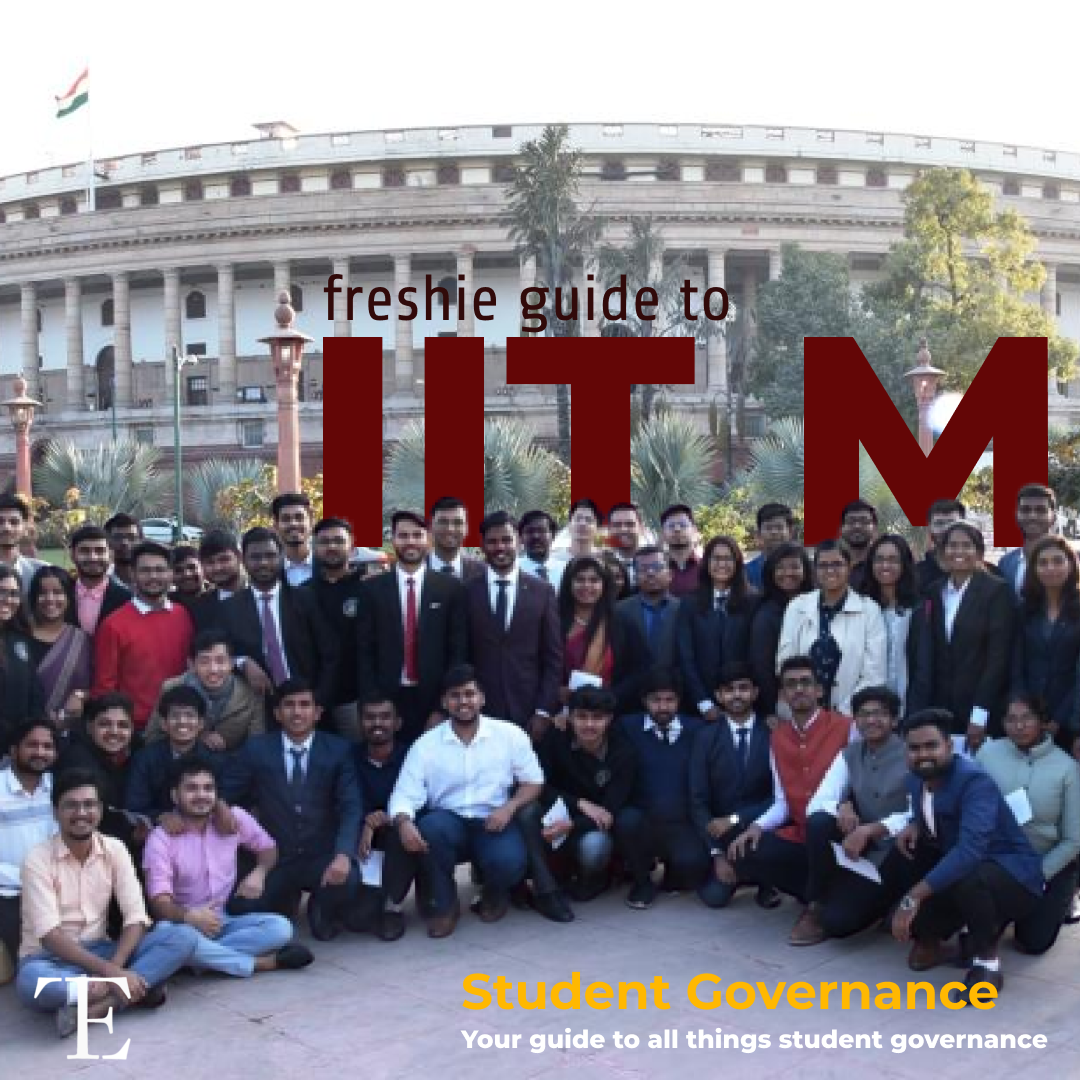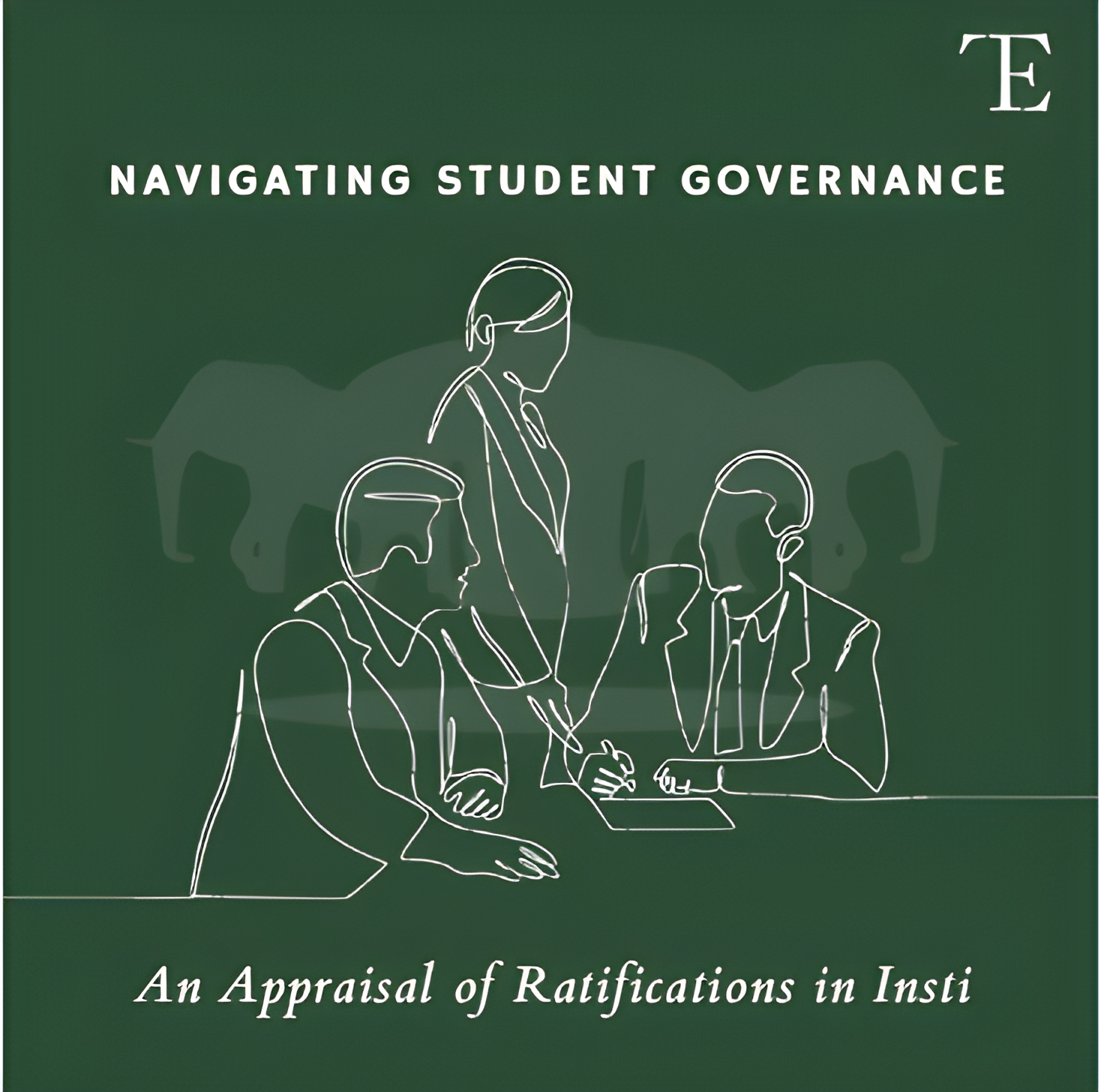Design by Hardhik Pinjala
Editor : Mahima Raut
There are two kinds of students on campus during election season: the ones who accost hungry students on their way to messes to campaign for their candidate friends and the ones who pretend to be on an important phone call to escape the ordeal. Such escapist tendencies aside, annual Institute Elections are a crucial process that play a pivotal role in shaping the path of student activities for the upcoming academic year in all spheres, whether it be hostels, academics, cultural affairs, or administration. Although it may feel like the day we voted and then left campus for a ‘one week holiday’ just happened, or like a different universe altogether, the election period is upon us once again.
So what is at stake in these elections? The candidates are standing for various positions in the Student Legislative Council and the Executive Council, the bodies that, along with the Student Ethics and Constitution Commission, make up the Institute Student Government elected by the general student body (GSB). Don’t stop reading just yet, here’s why you should care.
The Legislative Council members are your friendly neighbourhood representatives for your academic and hostel concerns. The council consists of one UG and one M.S./Ph.D student representing each of the 16 departments, 4 M. Tech students, and one student for each of the 19 hostels, making a grand total of 55 legislators. You can vote for your own department legislator and your own hostel legislator.
Whew, that’s a lot of people… What do they all do?
Well, since they’re elected by you and represent you, they listen to your concerns and requests and work on them. Your department legislator might work to install some useful facilities in the department building, for instance, or propose to increase the stipend for Ph.D. students.
This time around, there are no elections for hostel legislators as we’re not actually in the hostels (clearly) and the current freshies haven’t even been allotted one. The Legislative Council as a whole also does a lot of other activities, including approving the budgets of the Executive Council and reviewing their manifestos.
So what is the Executive Council? The Executive Council is composed of the grand institute-level posts – you might have a faint memory of these names by seeing them in the avalanche of smails. They are the Student General Secretary, Sports Secretary, Academic Affairs Secretary, Co-Curricular Affairs Secretary, Cultural Affairs Secretaries (Art and Literary), Hostel Affairs Secretary, International and Alumni Relations Secretary and Research Affairs Secretary, with one Speaker to preside over them in the SLC. Each Secretary has their own role, and spearheads the activities within their field across the whole of insti. Most of these Secretaries are elected by the entire GSB, with the exception of the Academic Affairs Secretary and the Research Affairs Secretary, for which the electorates are the students from taught and research programs respectively.
This leaves us with the SECC, which is akin to a judiciary system. The core members are not elected but nominated by the Chief Commissioner and the coordinators are selected through applications. The SECC ensures that our Students’ Constitution is upheld, and part of this role is to regulate the Legislative and Executive Councils and hold them accountable. The SECC is also in charge of organising the elections for the councils.
So How do Elections Work Usually?
To induce some feelings of yearning for the BC (before corona) era, let us look at the usual campaign procedures and rules followed by candidates on campus.
The Soapbox is an event where candidates are given 7-8 minutes to pitch their vision and manifesto to the students, following which their presentations are cross-questioned by the Executive Council, other stakeholders, and the audience. As this is the only public forum of debate for the elections, it is an event that sees tremendous footfall and passionate (read: heated) crowds and one where a popcorn stall would thrive.
Executive Council candidates may get printouts of their manifestos at the DoSt Office, with a maximum of 7 copies every 3 days. Candidates are allowed to send no more than two emails to the student body, and can display posters in designated notice boards in common areas such as messes, hostels, and departments, depending on the nature of the post and with permission of the SEC. Posters of Executive Council candidates may also be published on the SEC’s official digital media pages.
The campaign timings on weekdays are 5-11 pm, and 10 am-11 pm on weekends and institute holidays, with a restriction of 10 pm for campaigning within hostels; campaigning activities are strictly limited to the campus premises. Door-to-door campaigning is permitted at specified timings, but occupants who want to avoid the possibly awkward encounters may do so by putting up a ‘Do Not Disturb’ notice. It is truly a blessing that the use of PA systems is prohibited, or it would have been highly probable to have ringing ears by the end of the day. Additionally, defacing of institute property, distribution of pamphlets, gifts to the electorate in cash or kind, and funding from any source are strictly prohibited to ensure a decorous and fair election.
What has Changed?
Some usual rules continue to be applicable. Executive Council candidates can request the SEC to publish their posters (maximum of two) and video manifesto (of not more than 5 minutes) on the official SEC page and on designated digital notice boards. Candidates can campaign through social media platforms such as Instagram or Facebook but only through SEC-approved unique handles and not their personal accounts. Non-executive council candidates can share a single poster, after being subjected to fact-checking by an SEC committee, through digital platforms through general accounts. No videos that can be considered as slandering other candidates may be shared.
The campaign period for the 2021 Institute Elections is from 24 March (Wednesday) 10 AM to 06 April (Tuesday) 5 PM.
Sharing any posts or messages, or engaging in any other activity that publicises or propagates one’s candidature before or after this period are considered violations. You can find the entire list of rules for the 2021 election season here, so you can be aware of what kind of campaigning is allowed and what is not.
Due to the online academic year and subsequent virtual elections, the SEC is trying to provide the candidates with alternate avenues to reach out to the students, such as the ongoing Know Your Knominees sessions for the Executive Council positions. Two of these sessions have already been held, the first one to introduce the candidates and the second one for the candidates to demonstrate their competence for the role. A third session will be held to detail manifesto and feasibility points. The doors are open for all students to actively participate and ask questions. You might want to check out the candidates’ manifestos here, by logging in with your LDAP credentials and clicking on the Elections tab. In addition to the soapboxes that will be held from 2nd-5th April, there will be a Closed Door Questionnaire by a Panel that includes members of T5E, the video of which will be recorded and published online in the first week of April.
Campaigns are now being conducted over Google Meets. Candidates can register with the SEC by mentioning the time and date of the session, the details of which can be found here. SEC will also organise Google Classrooms to reach out to specific departments.
The candidates can also interact with the GSB through various channels of the SEC-hosted Discord server; these interactions will be subject to scrutiny as per the campaign norms. Regarding any external forums organised by individual students, permission must be sought from the SEC along with the consent of all the candidates who have filed for the post to ensure fair treatment.
How does the voting work?
When all is said and done, the responsibility to vote rests upon your shoulders. This might sound like an easy job – you just press one button, simple as that. But there’s a lot that goes on behind the scenes. The three options in front of you – Vote for a candidate, Reject all candidates or Abstain from voting – translate to a detailed system unique to insti that tries to ensure maximum fairness, and it is a must to understand how it works before you point your cursor at whichever button looks most appealing.
First off, all candidates for a post are considered rejected and no winner will be chosen if more than 50% of the electorate has cast non-abstain votes, and out of these votes, more than 50% have rejected all candidates. Even a unanimous candidate can’t win in such a case, ensuring that not just anybody can get elected simply because they’re the only option.
For posts with upto two candidates, the system of first-past-the-post voting is followed. Despite the multi-hyphenated name, it’s a fairly basic concept. Given the candidates are not rejected, the candidate who has received the highest number of votes is declared the winner.
In the case of more than two candidates, we follow a procedure called the instant runoff system. When voting for these posts, you don’t just pick a single candidate – you rank all the candidates in order of your preference. Given the candidates are not rejected, the number of first preference votes received by each candidate is counted, and if a candidate has more than 50% of the total first preference votes, they are declared the winner. Otherwise, the process moves on to the next round by eliminating the candidate with the least votes and distributing those votes among the rest of the candidates as per the second preference of each voter. This process continues until a candidate achieves the required 50%.
Though the voting process has moved online along with the entirety of our insti lives, the portal will look the same as usual. The process is identical to the previous years, with the inclusion of certain additional measures during the login process. Before a student can enter the voting page, they must undergo a multi-step authentication process. Similar to the past video tutorials posted by the SEC, a tutorial for the voting process will be shared by them as well.
Now that you know what to expect for the upcoming weeks, it is worth emphasising that it is not enough to uncritically vote for someone just to get it out of the way, or to vote for someone because you know them personally. Show up for the soapboxes and listen. Read manifestos and question them. Report malpractices. Make an informed choice!




